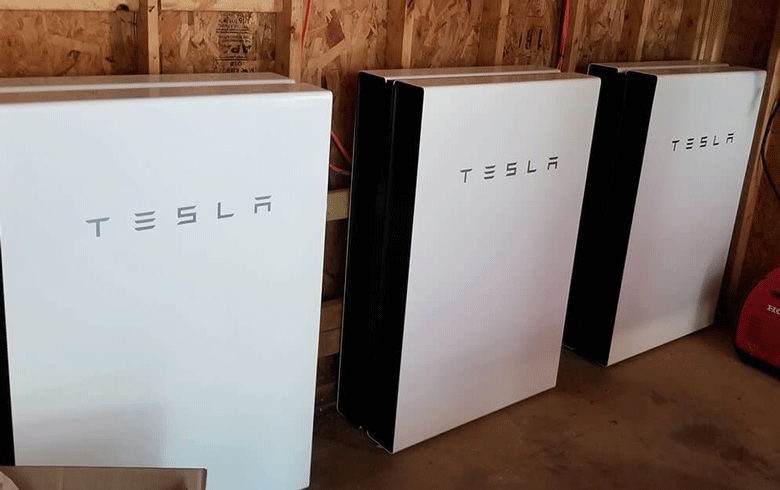Sandy Oliver should be getting paid the big bucks by Tesla’s marketing team. Describing how she snuggles up to her smartphone to gaze lovingly at the app for her Powerwall—Tesla’s in-home backup battery system—Sandy builds a visceral connection for the otherwise esoteric and dull topic of energy resilience.
“When the world is going downhill,” she said at the end of her three-minute talk at the Islesboro Energy Jamboree this spring, “Tessy’s got my back.” Tessy, of course, being the affectionate nickname Sandy (who writes the Journal of an Island Kitchen column for The Working Waterfront) gave her Powerwall.
Giving folks the chance to experience the fun, emotional, and personal side of energy systems is one of the best ways to help us shift to cleaner, safer, and more reliable options for how we get around, heat our homes, and keep the lights on during storms.
For the first few seconds, I hadn’t realized we were under power, it was so quiet.
At the Islesboro event, I saw my self-described “not-a-car-person” colleague walk away from test driving an electric car with a look of glee, declaring she wants to buy one. Sales of electric lawnmowers will likely see a notable blip after a landscaping company showed off their brand-new smooth and quiet electric mower.
I wouldn’t be surprised if we saw a few more folks on electric bikes after trying them out at the jamboree or hearing from a resident who gets around the island on her E-bike. I’ve been itching to ride an E-bike for years and have now added one to my wish list after zipping by the Island Market.
Talking to people about energy is literally my job. But unless I’m meeting with a fellow energy nerd, bringing up the topic is rarely where
I start the conversation. Understanding what keeps people up at night, or what’s fun and exciting, is more effective.
This is why I’m excited about several projects at the Island Institute. Through a program funded by the U.S. Department of Energy (DOE), Islesboro and Eastport are getting help preparing for some very real challenges—electrical outages, old and leaky homes, and sea level rise.
Islesboro is looking at getting off fossil fuels, particularly since residents see the effects of climate change with access to the ferry and some roads affected by rising seas. Eastport is receiving support on how to use a large battery for backup power during outages, to be charged in part by tidal and solar power.
Making energy tangible is also why I’m excited to get folks out on electric boats. While in Eastport in April as part of its DOE project, I met with people who fish, run boat yards, manage the port, and run aquaculture businesses, all eager to learn about electric boats. The sooner we can get them in use in their working lives, the sooner they’ll be able to share their real-life experiences with how quiet and easy the vessels are, and what it was like to switch over from gasoline and diesel engines.
On a recent trip to see family in Nova Scotia, I visited the Centre for Ocean Ventures & Entrepreneurship on Halifax Harbour and saw the 37-foot hybrid electric fishing boat Alutasi, retrofitted by startup Glas Ocean Electric and acquired by Sma’knis, a Mi’kmaq- and veteran-owned marine safety and security company. While we couldn’t go for a ride during my visit, I saw her up close with a short trip on a rigid inflatable powered by a 10 hp electric outboard motor. For the first few seconds, I hadn’t realized we were under power, it was so quiet.
One thing I haven’t mentioned yet is cost. All these electric options are expensive up-front. I also understand that contemplating heat pumps, home energy storage, or electric boats is generally reserved for those with significant capital. We need to change that.
In the meantime, while we work on lowering the cost and financial risk for everyone in Maine and beyond, I can’t wait to see more neighbors and colleagues sharing their real-life experiences switching to electric options.
Emma Wendt is a community development officer working on energy issues with the Island Institute, publisher of The Working Waterfront. She may be reached at ewendt@islandinstitute.org.





